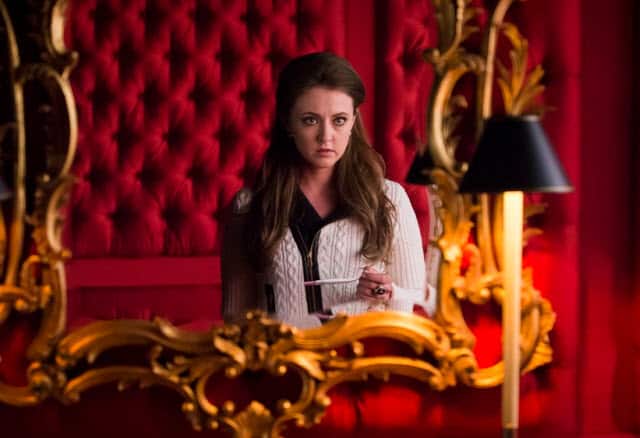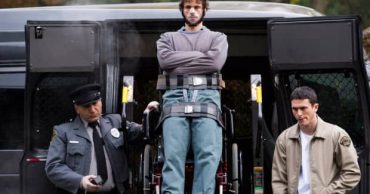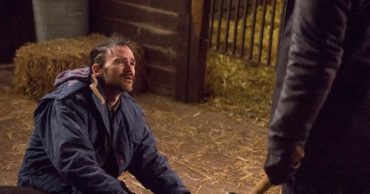
“Should the universe contract? Should time reverse and teacups come together?” In David Slade’s directorial return to Hannibal, he beautifully represents the sadness found in the writers’ script (three people are credited in “Ko No Mono,” including Fuller). The image of the teacup coming back together is something tonally similar to the now joked-about bag from American Beauty. As it splinters back into form to whatever melancholic song is playing, the moment no longer belongs to Hannibal but to a greater, general idea of how time might function in a different universe. Time, of course, is something that Fuller and company mess around with in this series, but no image thus far (including the reversal of time when Will is imagining executing himself in “Hassun”) has been as striking as the teacup. Nothing has drawn the same amount of attention to itself. It almost exists in a vacuum, no other characters on the screen. As much as we–or Hannibal or Will or whoever–would like to reverse time, we can’t. The realization of that shouldn’t be so affecting because it shouldn’t be any kind of surprise, but it clearly has a powerful effect here.
Three characters are shown crying in “Ko No Mono” in a rather noticeable way, all of which deal with the breaking of relationships between child and parent. First, one of the children visiting the Verger property (which looks a whole lot like a really creepy version of Disneyland from afar) starts to weep when Mason talks to him about his foster caregiver and “kitty cat” (Pitt is way too good in this role). This is a character who obviously isn’t important to Hannibal, but the scene sets a precedent for the rest of the episode; it also reminds us of Mason’s process of absorbing tears and seemingly adding them to his drinks, which is a variation of how Hannibal consumes parts of his victims. The other two characters who cry are much more important, however. When Will and Hannibal are speaking frankly with one another about Abigail Hobbs, Will mourns her. The most interesting part here is how up-front Hannibal is. He admits to taking Abigail away from him. Annoyingly, the script continues to dance around things, not definitively letting Hannibal say “Yes, I killed her,” but the implication and Mikkelsen’s delivery give the admission weight. We’ve seen Will dream of Abigail this season, and we know how much of a surrogate daughter she was to him (and to Hannibal and Alana). The loss of her is devastating, and Hannibal has done a fine job of not forgetting how important that relationship was and is to Will.
Margot loses a child in a literal way and cries for what that represents. This one is a bit more complicated, because just as Margot slept with Will not for her own pleasure but for the purposes of procreation, I take Margot’s reaction to be more indicative of losing the thing that can get her out from under Mason and not necessarily a sadness that comes from being denied a chance at motherhood in this instance (if all she wants is to be a mother, adoption is always an option). The sequence in which Margot wakes up after the car accident is horrifying in a different kind of way for Hannibal, dehumanizing Mason even further and turning him into this series’ Joker. Sympathy for Margot is about as easy to have as anything, especially since it looks like she was ready to just leave altogether.
These examples draw a lot of attention to parenthood, which is something Hannibal doesn’t usually put at the top of its list of themes to explore. We’ve seen bits and pieces of it throughout the two seasons so far, but because we don’t know any of the four central characters as either a parent or child (minus Abigail being a stand-in daughter; and I guess you could make a claim that Jack sometimes acts as a father figure), it’s never at the forefront of what an episode of Hannibal is doing. By that standard, I don’t know how we’re meant to interpret the focus of parenting in “Ko No Mono” beyond loosely tying it to that image of the shattering teacup. Without the capacity to reverse time, parenting is the best shot at a second chance for people. Though we’re often unsuccessful, we try to rectify our own mistakes by helping raise our children from a position of supposed experience and wisdom. Will isn’t immediately attached to the idea of becoming a parent, but he anticipates that attachment and what it can mean for him. When it’s taken away, he goes into rage mode, and the only thing that stops him from killing the person responsible is related to plot points.
That’s probably a good transition to start talking about those plot points, because “Ko No Mono” sets up a lot. Even though keeping Freddie Lounds alive makes the most sense, I still have issues with how it was handled, mostly because the execution of the scenes in last week’s episode gave no indication that Will was on a mission to get Freddie to listen to him after he physically attacks her more than once after disarming her. In that sense, I consider it one of the few real miscalculations of the show thus far, because it’s a cheap, manipulative way of pulling off a reveal that comes off as something trying to be clever when it’s really the exact opposite. But, whatever. It has happened and now we know that both Alana and Jack are aware of what’s going on, which are both huge plot points in their own ways. For several episodes, Jack’s position has been somewhat unclear, since he’s said things to Will (albeit, in front of Hannibal) that suggest he’s done buying into what Will’s selling. Now, that fight scene that opened up the season and the path towards it are nearly crystal clear. Perhaps the more interesting part, however, is how “Ko No Mono” uses Alana, since she’s been a character whose strength in positioning has drifted further and further the closer she’s been to Hannibal. It’s great to see her make use of her analytic abilities and intuition. Also, I can’t remember the last time she was at a crime scene as a consultant to help provide insight (here, she joins Hannibal and Will, which seems like an oddly crowded crime scene to me). Now that she knows, though, I would assume Hannibal would immediately pick up on any change in how she acts around him, so she’ll either be used unsuccessfully as live bait or else she’ll have to come up with believable excuses not to see him. Or, you know, the next episode might just kick into full-gear and not force us to wait until the finale to see how everything unravels (which, given the titles of these episodes, would make sense, since the finale–“Mizumono”–is supposed to be a dessert enjoyed after the final substantial portion of the kaiseki meal).
Other Thoughts:
– The opening sequence in which we see the raven stag and the wendigo is signature Hannibal, and I’m beginning to think Fuller just adds some of these to enhance the visual aesthetic and not necessarily to have us interpret them. That said, this, to me, seems like a representation of Will luring Hannibal in by playing dead, then pouncing on him in a way that is similar to how Hannibal attacks his victims.
– Fuller has talked about the eating of the songbirds as a scene that has sexual connotations, but I don’t really see that as a useful way of looking at the scene. There are other things that might suggest something else about the Will-Hannibal relationship than what it looks like at face value, such as how Hannibal kind of tips off Mason about what Margot is doing as a jealous way of maintaining Will’s attention, but the homoerotic stuff that some viewers latch onto in Hannibal sounds more like viewer-response theory than authorial intent.
– Readers and/or viewers of Harris’ work and its adaptations will know the significance of the burning corpse in the chair, which is used in this episode as a fake-out for Hannibal to think Freddie is dead. While, as mentioned earlier, I still have problems with how the Freddie reveal is executed, I like what this means going forward in terms of how that burning corpse will probably come back.
– In fitting with the Japanese themes of the season, there’s plenty of Eastern scoring here, none of which I know anything about on technical level, but all of which I find entertaining. Someone who does not quite about musicality and who talks about it in relation to Hannibal is my co-host for a Hannibal podcast that I do, This is Our Design. That is the first and last time I will do shameless plugging in these reviews, if just because I think that musical analysis is incredibly interesting.
– David Slade continues to be a director of legendary quality. Hannibal is actually the only project that has aired/been released in 2013 and 2014 that he’s worked on so far.
– “You’re frequently chilly, Margot.”
[Photo via NBC]
 Follow Us
Follow Us






excellently written, as always
How do you feel about the show being renewed for a 3rd season?